Comment: នេះអាចសបញ្ជាក់ថាលោកហ៊ុនសែនមិនមានចេតនាកែប្រែស្ថានភាពរបត់នយោបាយខ្មែរទៅរកលទ្ធិប្រជាធិបតេយ្យសេរីពហុបក្សតាមការទាមទាររបស់សហគមអឺរ៉ុបទេ ហើយការកំណត់ទៅចិនដើម្បីចុះហត្ថលេខាពាណិជ្ជកម្មដែលមានផលតិចជាងEBAច្រើនណាស់របៀបនេះ ជាការផ្គើនទៅលើសហគមអន្តរជាតិនិងប្រជាជាតិខ្មែរទាំងមូលដែលស្រឡាញ់លទ្ធិប្រជាធិបតេយ្យនិងការបោះឆ្នោតដោយសេរីយុត្តិធម៍នោះ។ នេះជាយុទ្ធនាការបន្តអំណាចផ្តាច់ការ ផ្តាច់សង្ខារជីវិតខ្មែរ ជាជាងប្រយោជន៍ជាតិនិងប្រជាជន។ ជាការមើលឃើញ សហគមអឺរ៉ុបនឹងដក២០ភាគរយតាមកំហិត ប្រជាពលរដ្ឋជាពិសេសកម្មកររោងចក្ររាប់សែននាក់នឹងអត់ការងារធ្វើ។ ២០ភាគរាយអាចថាតិច តែវាធ្វើអោយកិត្យានុភាពនិងភាពទុកចិត្តនៃការវិនិយោគទុននៅកម្ពុជាពីសំណាក់អ្នកវិនិយោគទុនល្អៗនឹងបាត់បង់។
10 July 2020
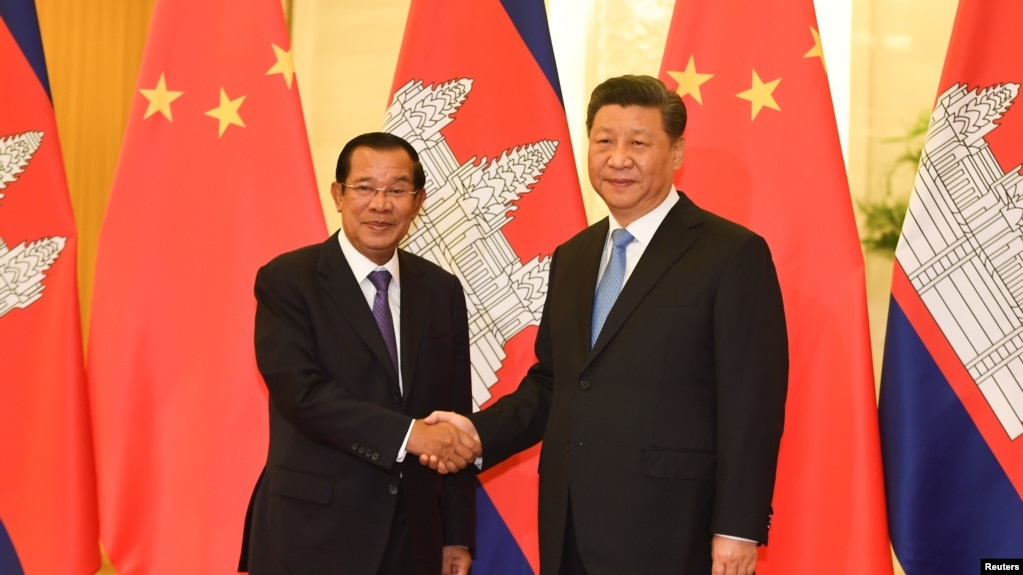
PrintPHNOM PENH —
Prime Minister Hun Sen is scheduled to be in Beijing on August 12 to sign a free trade agreement with his Chinese counterpart. The new agreement is expected to usher in an enhanced level of economic cooperation between the two countries, deemed especially important to Cambodia.
Cambodia’s undeveloped economy has benefited from close ties with Europe since the United Nations Transitional Authority of Cambodia helped govern the country from 1991 to 1993 following years of war that had decimated the country.
The deal is another sign of the growing friendship between China and Cambodia. China has become the Kingdom’s largest investor and its’ geopolitical support to counter the West and, on occasion, ASEAN.
The negotiated Cambodia-China Free Trade Agreement (FTA) has been kept under wraps since talks began in December. Recently, officials have said it will hinge on agricultural trade and build on Cambodia’s existing trade with the Asian and global economic powerhouse.
Vongsey Vissoth, a permanent secretary of state at the Economy Ministry, confirmed on Wednesday in a press conference that Prime Minister Hun Sen would make the trip to Beijing to sign the agreement.
“Now we have FTA from China and [we] try the best,’’ Vongsey Vissoth said. ‘’FTA is just a market, but we need to have products to export.’’
On April 7, Hun Sen called on citizens to focus on growing and processing agricultural products to sustain the economy because, he noted, other economic drivers like tourism and manufacturing were faltering due to the COVID-19 pandemic.
“We will use this difficult time as an opportunity for Cambodia’s agricultural sector, which has slow growth,” Hun Sen said.
Vongsey Vissoth acknowledged that there would be challenges to overcome to fully utilize the FTA, noting requirements for exporting to China would be related to pricing and quality and sanitation of goods and products. The Chinese had indicated, he said, that fish exports had potential in the future.
However, multiple reports including some from the Mekong River Commission, show that fish numbers are fast dropping in Cambodian rivers on account of climate change and the increasing number of dams along the mainstream Mekong.
Cambodia has also struggled to consolidate its agricultural production in the past, largely because of the lack of infrastructures, such as warehousing, cold storage, processing plants, and generally high operating costs, including electricity.
Government figures show that bilateral trade in 2018 was around $7.4 billion, which was heavily skewed in China’s favor, accounting for more than 80 percent of trade. That year, Cambodia exported around $800 million, mostly in agricultural products, and imported large quantities of raw materials for the manufacturing and construction sectors.
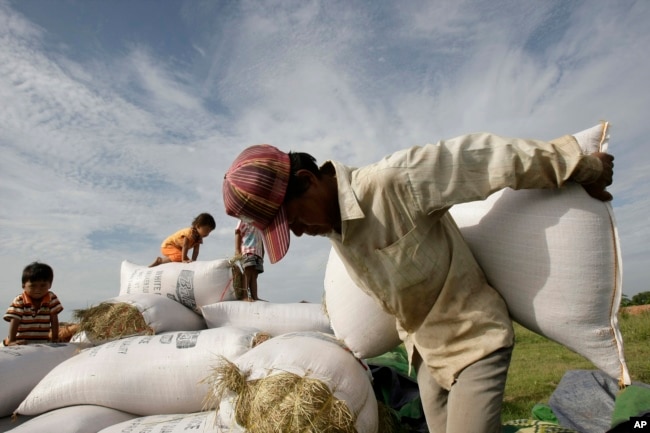
Hean Vanhan, the secretary of state of Agriculture Ministry who took part in the FTA negotiations, said a number of products will be on a tariff-free list, which will be reviewed periodically. For now, he said, rice, bananas, and mangoes will be on the list.
“We opened the blockages and obstacles [to trade],” he said. “The government has tried [to get] the policy and then we depend on the private companies’ capacity.”
A critical aspect to the FTA will be whether it can offset losses from the partial suspension of trade benefits to Europe. There has been no public mention of whether China has agreed to import clothing produced in Cambodia. China, itself, is an exporter of clothing and raw materials used in the manufacturing process.
Hean Vanhan said the FTA would be able to limit damage from the suspension of EU privileges but did not elaborate on how.
“If we lose EBA, I think this agreement, we have has very large benefits and it is better,” Hean Vanhan said.
Ken Loo, secretary-general of the Garment Manufacturers Association in Cambodia, said the trade agreement will benefit Cambodia’s garment sector since Cambodia will be able to export to China without tariffs, even though exports to China were seven to eight percent, compared to the 45 percent already being exported to the European Union.
“I can’t say whether it is possible [to replace EBA] or not, but I want to say FTA with China is a good point,” Ken Loo said.
The FTA with China is Cambodia’s first bilateral trade agreement with a foreign country, and the negotiations occurred amid the backdrop of growing Chinese influence and investments in the construction, real estate, and tourism markets.
The friendship was strengthened when China donated tons of aid to Cambodia to fight the COVID-19 pandemic, with Prime Minister Hun Sen being the only foreign leader to visit Beijing in February to meet Chinese President Xi Jinping during the peak of China’s outbreak.
Skeptics of the new deal say it will pull Cambodia closer into China’s orbit, making it more reliant on Beijing; others were concerned whether this was a lost opportunity to improve labor standards and environmental protections in bilateral trade.
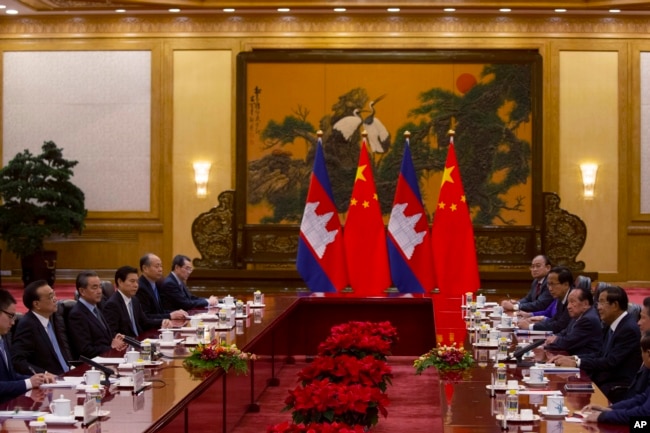
Sophal Ear, associate professor of diplomacy and world affairs at Occidental College in Los Angeles, said if the FTA does not improve economic and working standards in the country, the increased trade would come at the cost of jobs and the environment.
“If the agreement is not about elevating labor, environmental, and intellectual property standards, this is a lost opportunity for Cambodia and China,’’ the professor said.
He added that the agreement will likely benefit China, which has a growing middle class that needs to be fed.
“Could China simply use Cambodia as a farm for Chinese consumers?” Sophal Ear asked.
“Food security is always on China’s mind, from Cambodia to Africa,’’ he said. ‘’It’s about supplying hungry mouths in China. Let’s hope this doesn’t make Cambodia the Southeast Asian version of a banana republic.”
Agriculture expert Yang Saing Koma said the pertinent question was whether Cambodian businesses will be able to take advantage of the FTA because China certainly had the capacity to fully utilize the agreement to its benefit.
“I think China wants the agreement,’’ said Yang Saing Koma, who is also a member of the fledgling Grassroots Democracy Party. ‘’China wants to expand its trade in the world. They want to be the economic power.”
“With the free trade agreement, their products can be easily imported to Cambodia, but the question is whether Cambodia can easily export to China?”
Paul Chambers, special advisor for International Affairs at the Naresuan University in Thailand, said that while the FTA could help both countries, it was “asymmetrically geared” towards benefiting China.
And this would be at the cost of Cambodia being sucked deeper into its dependency on China, he added.
“The FTA will enable Chinese corporations much greater power throughout Cambodia. As a result, besides becoming a Chinese dependency, Cambodia will become a vassal or backwater of China,” he said in an email.
កម្ពុជានិងចិនត្រៀមចុះកិច្ចព្រមព្រៀងពាណិជ្ជកម្មសេរី ខណៈកម្ពុជាសម្លឹងមើលសក្តានុពលនាំផលិតផលកសិកម្មចេញទៅចិន
10 កក្កដា 2020
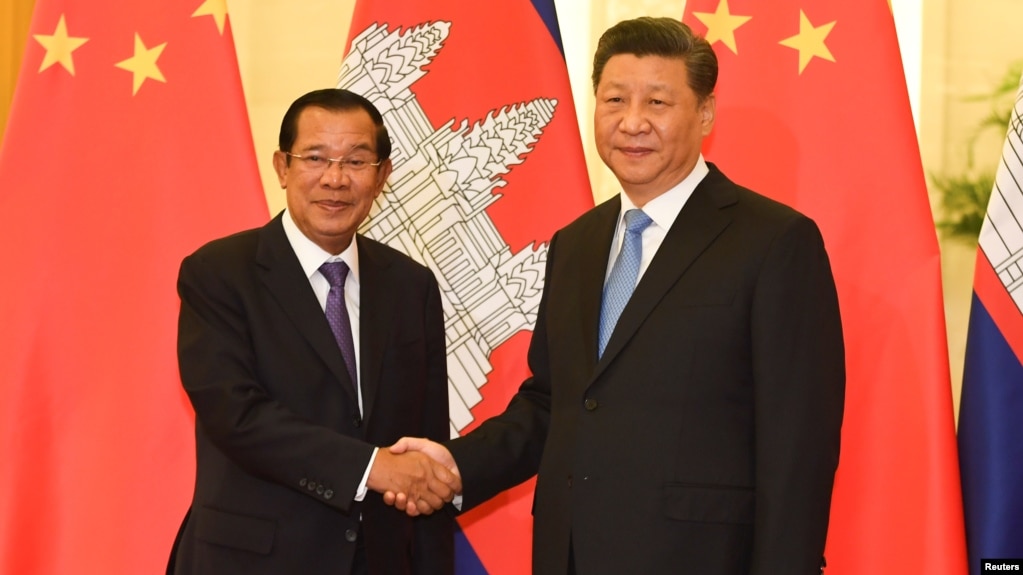
ទំហំពាណិជ្ជកម្មទ្វេភាគីកម្ពុជាចិន មានទឹកប្រាក់ប្រមាណ៧,៤ ពាន់ លានដុល្លារអាមេរិកកាលពីឆ្នាំ២០១៨។ នេះ បើយោងតាមក្រសួងពាណិជ្ជកម្ម។ នៅក្នុងនោះ កម្ពុជា មានឱនភាពដោយសារតែការនាំចូលពីប្រទេសចិនមានទំហំប្រមាណ៦ពាន់ លានដុល្លារទៅហើយ ដែលខុសគ្នាប្រមាណ៨០ភាគរយ។ភ្នំពេញ —
មេដឹកនាំកម្ពុជា និងចិន គ្រោងចុះហត្ថលេខាកិច្ចព្រមព្រៀងពាណិជ្ជកម្មសេរីទ្វេភាគី (FTA) នៅក្នុងខែសីហាខាងមុខនេះ។ កិច្ចព្រមព្រៀងនេះ ធ្វើឲ្យកម្ពុជាដែលជា«មិត្តដែកថែប»របស់ចិន អាចនាំផលិតផលកសិកម្មចេញទៅប្រទេសមហាអំណាចមួយនេះបន្ថែមទៀត។ នេះ បើតាមមន្រ្តីជាន់ខ្ពស់របស់រដ្ឋាភិបាលកម្ពុជា។
កិច្ចព្រមព្រៀងនេះ ត្រូវបានចរចាតាំងពីខែធ្នូ ឆ្នាំ២០១៩ ហើយតាមគម្រោងត្រូវចុះហត្ថលេខានៅក្នុងខែវិច្ឆិកា ឆ្នាំ២០២០នេះ នៅពេលមេដឹកនាំចិនមកប្រទេសកម្ពុជា ដើម្បីចូលរួមកិច្ចប្រជុំកំពូលអាស៊ីអឺរ៉ុប ដែលកម្ពុជាធ្វើជាម្ចាស់ផ្ទះ ប៉ុន្តែកិច្ចប្រជុំនេះត្រូវបានលុបចោលដោយសារជំងឺកូវីដ១៩។
កិច្ចព្រមព្រៀងនេះ ធ្វើឡើងស្របពេលដែលកម្ពុជាប្រកាសថា នឹងផ្តោតលើវិស័យកសិកម្ម ក្រោយប្រជាពលរដ្ឋបាត់បង់ការងារធ្វើ ហើយបន្ថែមពីនេះទៅទៀតកម្ពុជានឹងរងគ្រោះដោយសារការដកប្រព័ន្ធអនុគ្រោះពន្ធ EBA របស់សហភាពអឺរ៉ុប នៅថ្ងៃទី១២ ខែសីហា ឆ្នាំ២០២០ខាងមុខ ដែលនឹងនាំឲ្យកម្ពុជាខាតបង់ទឹកប្រាក់ជាង១ពាន់ លាន ដុល្លារក្នុងមួយឆ្នាំ។ ការដាក់ទណ្ឌកម្ម EBA នេះធ្វើឡើងដោយសារសហភាពអឺរ៉ុបរកឃើញការរំលោភសិទ្ធិមនុស្សជាប្រព័ន្ធ និងការធ្លាក់ចុះលទ្ធិប្រជាធិបតេយ្យនៅកម្ពុជា។
លោក វង្សី វិស្សុត រដុ្ឋលេខាធិការក្រសួងសេដ្ឋកិច្ច និងហិរញ្ញវត្ថុ មានប្រសាសន៍ក្នុងសន្និសីទសារព័ត៌មានមួយកាលពីថ្ងៃពុធថា លោកនាយករដ្ឋមន្រ្តី ហ៊ុន សែន នឹងដឹកនាំគណៈប្រតិភូទៅទីក្រុងប៉េកាំង ដើម្បីត្រៀមចុះហត្ថលេខាលើកិច្ចព្រមព្រៀងនេះ នៅថ្ងៃទី១២ ខែសីហា ឆ្នាំ២០២០ គឺជាថ្ងៃដែលការដកប្រព័ន្ធអនុគ្រោះពន្ធ EBAចូលជាធរមាន។
លោកបន្តថា ដោយសារកម្ពុជារងគ្រោះដោយសារជំងឺកូវីដ១៩ ផលិតផលកសិកម្មនឹងក្លាយជាអាទិភាព ប៉ុន្តែលោកថា ផលិតផលទាំងនោះត្រូវតែជាតម្រូវការរបស់ចិន មានទីផ្សារ មានគុណភាពល្អ និងតម្លៃប្រកួតប្រជែងផងដែរ។
លោកមានប្រសាសន៍ថា៖ «អ្វីដែលអាចនាំចេញបាន ត្រូវខិតខំសម្រួចនាំចេញឲ្យបាន។ ឥឡូវយើងបាន FTA (កិច្ចព្រមព្រៀងពាណិជ្ជកម្មសេរី) ពីចិនហើយ យើងប្រឹងប្រើប្រាស់ឲ្យអស់លទ្ធភាព។ FTA គ្រាន់តែជាទីផ្សារតើ ប៉ុន្តែយើងត្រូវមានរបស់នាំចេញទៅ»។
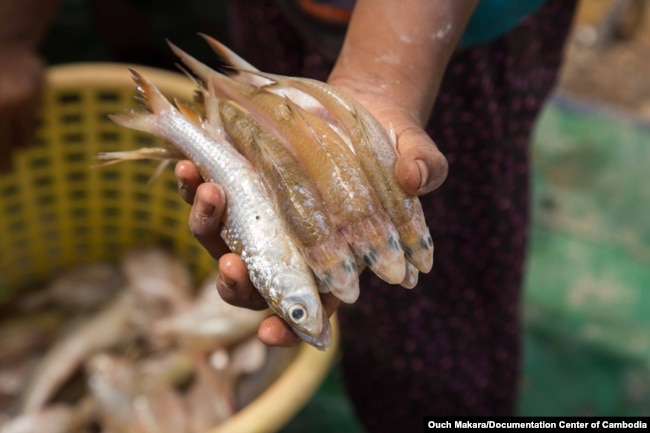
លោក វង្សី វិស្សុតឲ្យដឹងថា ប្រទេសចិនបានប្រាប់កម្ពុជាថា កម្ពុជាមានសក្តានុពលការនាំត្រីចេញទៅប្រទេសចិន។ លោកមានប្រសាសន៍ថា៖ «ជាពិសេសត្រី។ ចិនថា ត្រីនៅកម្ពុជាមាន Potential (សក្តានុពល) ខ្ពស់ណាស់ក្នុងការនាំចេញទៅចិន ព្រោះត្រីនៅស្រុកយើងនៅថោកនៅឡើយទេ ធៀបនឹងចិន»។
បើតាមលោកវិស្សុត វិស័យកសិកម្មកម្ពុជា មានប្រមាណ២៥ ភាគរយនៃផលិតផលក្នុងស្រុកសរុប (GDP) ហើយប្រជាជននៅក្នុងវិស័យកសិកម្ម មានប្រមាណ៤០ ភាគរយនៃកម្លាំងពលកម្មសរុប។
លោកមានប្រសាសន៍ថា៖ «យើងគិតថាសំណាងប្រទេសយើងមួយទៀត ដែលមានវិស័យកសិកម្មនៅរួមចំណែកធំក្នុង GPD គឺប្រមាណ២៥ភាគរយនៃ GDP…ធំដែរ»។
កាលពីខែវិច្ឆិកាឆ្នាំ២០១៩ លោកនាយករដ្ឋមន្រ្តី ហ៊ុន សែន បានថ្លែងថា កិច្ចព្រមព្រៀងនេះ នឹងជួយកម្ពុជាក្នុងការនាំផលិតផលទៅប្រទេសចិនឲ្យបានច្រើនបន្ថែមទៀត។
លោកមានប្រសាសន៍ថា៖ «ពេលណាដែលយើងមានកិច្ចព្រមព្រៀងសេរី ពាណិជ្ជកម្មសេរីរវាងកម្ពុជាចិន ទីផ្សារចិនបើកចំហសម្រាប់ទំនិញអ៊ីចឹងនេះ ជាផលប្រយោជន៍សេដ្ឋកិច្ច។ សូម្បីតែអាមេរិកក៏រកស៊ីជាមួយចិន។ អឺរ៉ុបក៏រកស៊ីជាមួយចិន។ រឿងអីមកបន្ទោសខ្មែរ! រកស៊ីជាមួយចិនមិនបាន?»។
ទំហំពាណិជ្ជកម្មទ្វេភាគីកម្ពុជាចិន មានទឹកប្រាក់ប្រមាណ៧,៤ ពាន់ លានដុល្លារអាមេរិកកាលពីឆ្នាំ២០១៨។ នេះ បើយោងតាមក្រសួងពាណិជ្ជកម្ម។ នៅក្នុងនោះ កម្ពុជា មានឱនភាពដោយសារតែការនាំចូលពីប្រទេសចិនមានទំហំប្រមាណ៦ពាន់ លានដុល្លារទៅហើយ ដែលខុសគ្នាប្រមាណ៨០ភាគរយ។ ប្រទេសទាំងពីរ គ្រោងបង្កើនទំហំពាណិជ្ជកម្មទ្វេភាគីដល់១០ពាន់ លានដុល្លារ ត្រឹមឆ្នាំ២០២៣។
លោក ហ៊ាន វណ្ណហាន រដ្ឋលេខាធិការក្រសួងកសិកម្ម ដែលបានចូលរួមក្នុងការចរចាបង្កើតកិច្ចព្រមព្រៀងនេះ ថ្លែងប្រាប់ VOA នៅថ្ងៃសុក្រនេះថា នេះជា«ការប្រឹងប្រែងបែបប្រវត្តិសាស្រ្តមួយ»របស់រដ្ឋាភិបាលក្នុងការបើកផ្លូវសម្រាប់ការពង្រីកពាណិជ្ជកម្ម។ លោកបន្តថា វិស័យឯកជន ត្រូវចូលរួមចំណែកធំក្នុងការបង្កើតផលិតផលនាំទៅលក់នៅប្រទេសចិន។
លោកថ្លែងប្រាប់ VOA ថា៖ «យើងបើកផ្លូវ បើកបារាស អ្វីដែលជាឧបសគ្គ។រដ្ឋាភិបាលយើង ខិតខំធ្វើការងារខាងគោលនយោបាយ អ៊ីចឹងវានៅពឹងលើសមត្ថភាពវិស័យឯកជន។ និយាយជារួម ត្រូវតែខិតខំប្រឹងប្រែង»។
លោកបន្ថែមថា៖ «ជាទូទៅគឺយើងខិតខំដើម្បីចំណេញទាំងអស់គ្នា។ ក្រុមការងាររបស់កម្ពុជាយើង ដែលដឹកនាំដោយឧបនាយករដ្ឋមន្រ្តី ហោ ណាំហុង លោកខិតខំប្រឹងប្រែង ហើយសុទ្ធតែជំនាញគ្រប់ក្រសួង បានចូលរួមជជែករឿងនេះ រៀបចំឃ្លាឃ្លោង ដើម្បីធ្វើម៉េចយើងទាញយកផលចំណេញ តាមដែលអាចធ្វើទៅបាន»។
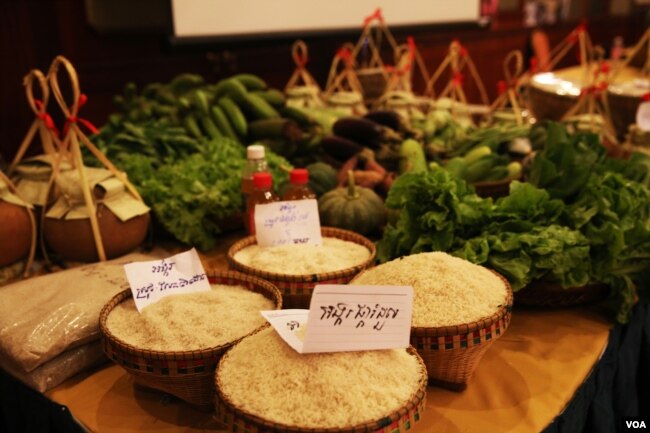
បើតាមលោក ហ៊ាន វណ្ណហាន ក្រោយពេលចុះកិច្ចព្រមព្រៀងភ្លាមកម្ពុជា នឹងមិនបង់ពន្ធការនាំអង្ករ ស្វាយ ចេក និងផលិតផលកសិកម្មផ្សេងៗទៀតចេញទៅប្រទេសចិននោះទេ។
លោកពន្យល់ថា នៅក្នុងកិច្ចព្រមព្រៀងនោះ មានការកំណត់ផលិតផលដែលមិនមានពន្ធទាំងស្រុង និងផលិតផលដែលនឹងបន្ថយការអនុគ្រោះពន្ធបន្តិចម្តងៗក្នុងរយៈពេល៥ឆ្នាំ ឬ ក៏១០ឆ្នាំ។
រដ្ឋលេខាធិការក្រសួងកសិកម្មរូបនោះ ក៏លើកឡើងដែរថា ទីផ្សារផលិតផលសម្លៀកបំពាក់នៅប្រទេសចិនធំជាងសហភាពអឺរ៉ុប ដែលលោកមើលឃើញថា ផលប្រយោជន៍កិច្ចព្រមព្រៀងនេះ អាចជំនួសការបាត់បង់ប្រព័ន្ធអនុគ្រោះពន្ធ EBA។
លោកមានប្រសាសន៍ថា៖ «យើងគិតទៅថា ទំហំពាណិជ្ជកម្មដែលទទួលបានពី EBAធៀបជាមួយទំហំទីផ្សារដែលយើងទទួលបានពីពាណិជ្ជកម្មសេរីរបស់ចិន មានទំហំខុសគ្នាឆ្ងាយណាស់។ អ៊ីចឹងប្រសិនបើយើងបាត់បង់ EBA នោះយើងគិតថា អ្វីដែលយើងបានមកជំនួសវិញនោះ គឺវាធំធេងណាស់។ វាប្រសើរជាងមុន…របស់ដែលល្អជាងមុន ធំជាងមុន»។
លោក ខេន លូ អគ្គលេខាធិការសមាគមរោងចក្រកាត់ដេរនៅកម្ពុជា (GMAC) និយាយថា កិច្ចព្រមព្រៀងនេះ ជាចំណុចល្អមួយដែលជួយដល់វិស័យកាត់ដេរ តែលោក មិនអាចនិយាយបានទេថា វានឹងជួយបំពេញការបាត់បង់ផលចំណេញពី EBA របស់សហភាពអឺរ៉ុប ឬ យ៉ាងណា។
លោកមានប្រសាសន៍ថា៖ «អត់អាចឆ្លើយថា ទៅរួច ឬ មិនទៅរួចទេ។ ប៉ុន្តែខ្ញុំចង់និយាយថា មាន FTA ជាមួយចិន អាហ្នឹងគឺជាចំណុចល្អ»។
បើតាមលោក ខេន លូ កម្ពុជានាំផលិតផលវាយនភ័ណ្ឌទៅសហភាពអឺរ៉ុបប្រមាណ៤៤ភាគរយ ចំណែកទៅចិនមានតែ៦ ទៅ៨ ភាគរយតែប៉ុណ្ណោះ។
លោក តែ តាំងប៉រ ប្រធានសហព័ន្ធសមាគមសហគ្រាសធុនតូច និងមធ្យម មានប្រសាសន៍ថា កិច្ចព្រមព្រៀងនេះ នឹងនាំឲ្យមានកំណើននៃការផលិតរបស់សហគ្រាសធុនតូច និងមធ្យមក្នុងប្រទេសកម្ពុជា ក្នុងនោះមានការកែច្នៃវត្ថុធាតុដើមចេញពីកសិកម្ម យកទៅលក់នៅប្រទេសចិន។ ប៉ុន្តែលោកថា កម្ពុជាខ្វះរោងចក្រផលិតកែច្នៃវត្ថុធាតុដើមទាំងនោះ។
លោកថ្លែងប្រាប់ VOA ថា៖ «ព្រោះយើងត្រូវការកែច្នៃច្រើនណាស់។ យើងខ្វះរោងចក្រហ្នឹងច្រើនអីតើ! ព្រោះកាលណាធ្វើពាណិជ្ជកម្មនាំ (ទំនិញ) ពីកម្ពុជាទៅចិន គឺយើងកែច្នៃពីខ្មែរយើងយកទៅលក់នៅទីផ្សារចិន។ អាហ្នឹងមានការកើនឡើង តាមការប្រមើមើលរបស់រដ្ឋាភិបាល»។
លោកបន្ថែមថា តាមរយៈកិច្ចព្រមព្រៀងនេះ អ្នកវិនិយោគចិន នឹងមកកម្ពុជាកាន់តែច្រើនបន្ថែមទៀត ហើយពួកគេ អាចបង្កើតរោងចក្រក្នុងប្រទេសកម្ពុជា។
លោកបណ្ឌិត យ៉ង សាំងកុមារ អ្នកជំនាញកសិកម្ម និងជាប្រធានគណៈកម្មាធិការនាយកនៃគណបក្សប្រជាធិបតេយ្យមូលដ្ឋាន មានប្រសាសន៍ថា កិច្ចព្រមព្រៀងនេះមានប្រយោជន៍ជាទូទៅសម្រាប់ការធ្វើពាណិជ្ជកម្មរវាងប្រទេស និងប្រទេស តែលោកបារម្ភថា តើកម្ពុជាអាចមានសមត្ថភាពផលិតបាន ឬ យ៉ាងណា និងមួយវិញទៀត ការនាំរបស់ពីចិនចូលមកកម្ពុជាមានទំហំច្រើន។ ដូច្នេះទំនិញទាំងនោះនឹងរួចពន្ធ ពេលចូលមកកម្ពុជា។
លោកមានប្រសាសន៍ថា៖ «ខ្ញុំគិតថា ចិនចង់បានកិច្ចព្រមព្រៀងហ្នឹង។ ហើយណាមួយចិន ចង់ពង្រីកវិសាលភាពនៃការធ្វើពាណិជ្ជកម្មរបស់គាត់ទូទាំងពិភពលោកដែរ។ គាត់ចង់ដើរតួមហាអំណាចសេដ្ឋកិច្ចមួយ។ ហើយកាលណាមានពាណិជ្ជកម្មសេរី ទំនិញរបស់គាត់ ក៏ងាយស្រួលនាំចូលទីផ្សារកម្ពុជាដោយស្រួលដែរ។ ប៉ុន្តែសំណួរសួរថាតើកម្ពុជា ចូលទីផ្សារចិនបានស្រួលអត់?»។
លោក អ៊ា សុផល សាស្ត្រាចារ្យផ្នែកការទូត និងកិច្ចការអន្តរជាតិនៅមហាវិទ្យាល័យ Occidental ទីក្រុងLos Angeles រដ្ឋ California សហរដ្ឋអាមេរិក មានប្រសាសន៍ថាលោកបារម្ភថា តើទំនិញអ្វី ដែលនឹងនាំចេញទៅប្រទេសចិន ដោយសារចិនមានទំនិញទាំងអស់។ លោកមានប្រសាសន៍ថា៖ «ប្រទេសចិនមានអ្វីៗទាំងអស់។ ប្រទេសកម្ពុជា អាចនាំអង្ករ និងផលិតផលផ្សេងៗចេញទៅលក់។ អ្វីដែលកម្ពុជាបង្កើត ប្រទេសចិន ក៏ប្រហែលជាបង្កើតដែរ។ ហើយតម្លៃរបស់កម្ពុជា មិនទំនងជាក្រោមតម្លៃនៅប្រទេសចិនទេ ដោយសារតម្រូវការសេដ្ឋកិច្ចនៅក្នុងប្រទេសចិន»។
លោក Paul Chambers ទីប្រឹក្សាផ្នែកទំនាក់ទំនងអន្តរជាតិរបស់សាកលវិទ្យាល័យ Naresuan ក្នុងប្រទេសថៃ មានប្រសាសន៍ថា ការព្រមព្រៀងពាណិជ្ជកម្មសេរីនេះ ជួយដល់ប្រទេសទាំងពីរ បើទោះវាមិនសមមាត្រ ដោយសារចិន នឹងទទួលបានផលប្រយោជន៍ច្រើនក៏ដោយ។
លោកបន្ថែមថា៖ «កិច្ចព្រមព្រៀងពាណិជ្ជកម្មសេរីនេះ នឹងផ្តល់ឲ្យចិនបន្ថែមទៀតនូវការធ្វើពាណិជ្ជកម្មការវិនិយោគ និងការងារសម្រាប់កម្ពុជា។ ប៉ុន្តែ កម្ពុជា នឹងកាន់តែជាប់ក្នុងការពឹងផ្អែកកាន់តែខ្លាំងថែមទៀតទៅលើប្រទេសចិន។ លោកបន្ថែមថា៖ «កិច្ចព្រមព្រៀងពាណិជ្ជកម្មសេរីនេះ នឹងកាន់តែធ្វើឲ្យបណ្តុំការរកស៊ីរបស់ចិន កាន់តែមានអំណាចខ្លាំងទូទាំងប្រទេសកម្ពុជា។ ហើយជាលទ្ធផល ក្រៅពីក្លាយជាអ្នកពឹងផ្អែកលើប្រទេសចិន កម្ពុជានឹងក្លាយជារដ្ឋរណបរបស់ប្រទេសចិន»៕
